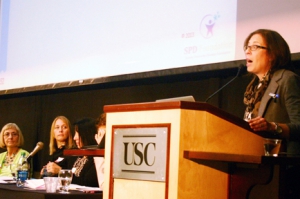By Mike McNulty
National experts on the sensory issues tied to autism and other neurodevelopmental disorders exchanged their respective research at the 24th USC Occupational Science Symposium, which brought together dozens of leaders from across the country to assess the field and prioritize future research directions.
Hosted by the USC Division of Occupational Science and Occupational Therapy and its Sensory Integration, Engagement and Family Program, more than 350 researchers, clinicians and educators attended the Nov. 7 event, titled “Sensory Integration at the Crossroads: Diverse Perspectives in Occupational Therapy Research.”
“We’ve entered into an unprecedented era for research on sensory integration therapy,” said Florence Clark, PhD, professor and associate dean of the division. “In just the past two years, researchers featured at this year’s symposium have conducted landmark randomized controlled trials demonstrating the effectiveness of sensory integration therapy for children diagnosed with autism, so it’s quite obvious why we are excited today.”

Sarah Schoen (right), PhD, associate director of research at the Sensory Processing Disorder Foundation in Greenwood Village, Colo., presents her research at the 2013 USC Occupational Science Symposium.
(Photo/Clarissa Tu)
In addition to behavioral, communicative, and social deficits, children and adults with autism or other neurodevelopmental disabilities also can have central nervous system dysfunctions that affect processing of sensory stimuli such as sound, touch, or motion. Because their brains atypically perceive, process and react to the surrounding environment, this dysfunction may be an underlying cause of behaviors such as rocking or spinning the body, inattention and hyperactivity often observed in this population.
The event was highlighted by the 2013 Wilma West lecture from Ellen Cohn, ScD, interim chair of the Department of Occupational Therapy at Boston University’s Sargent College of Health and Rehabilitation Sciences. Cohn stressed the importance of respecting parents’ goals, ambitions and values for all practitioners who treat children with autism.
Established in 1988, the symposium is the division’s premier academic event that gathers leaders from various health, medical and social science professions and disciplines to propel forward the discipline of occupational science.
Notable past speakers include former USC and National Football League quarterback and advocate for persons with autism spectrum disorders Rodney Peete, primatologist Jane Goodall and theoretical physicist Stephen Hawking.

